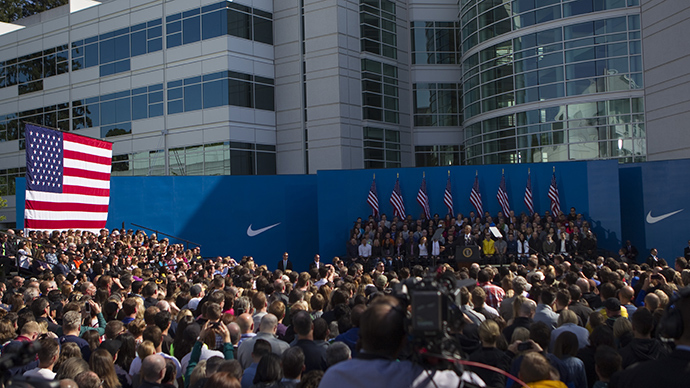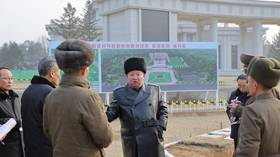Obama touts TPP trade deal amid Nike support

President Barack Obama has pitched a controversial trade agreement it was negotiated between the United States and 11 others at the headquarters of Nike. The footwear giant says it expects to add 10,000 domestic jobs if the deal is approved.
The president was at the shoe company’s corporate headquarters on
Friday to speak in support of the Trans-Pacific Partnership, or
TPP, a 12-nation agreement in the works that would establish new
rules for tariffs with regards to trade involving the US and a
host of Pacific Rim partners.
“If I didn’t think that this was the right thing to do for
working families then I wouldn’t be fighting for it,” Obama
from a stage outside Nike’s main office in Beaverton, Oregon.
Earlier in the day, Nike CEO Mark Parker said approval of the TPP
would “accelerate investment in advanced footwear
manufacturing” in the US.
“Footwear tariff relief would allow Nike to accelerate
development of new advanced manufacturing methods and a domestic
supply chain to support US-based manufacturing," the company
said in a statement, through which it could expect the
creation of up to 10,000 manufacturing and engineering jobs, as
well as perhaps 40,000 gigs as an indirect result during the next
decade.
It's time to #LeadOnTrade and pass a trade deal that helps Americans get ahead. http://t.co/6DWm9JG7yc
— The White House (@WhiteHouse) May 8, 2015
“Free trade opens doors, it removes barriers, it creates
jobs, it lets us invest more in the things that matter,”
Parker said. “That's innovation, that's creativity, that's
people.”
But the opinions of the sneaker king and US president aren’t
exactly universal. Police in riot gear was deployed outside of
the Nike campus on Friday morning, local media reported, in order
to monitor demonstrations who had gathered to protest the TPP.
Elizabeth Swager, the director of the Oregon Fair Trade Campaign,
told The Oregonian that she considered the TPP
“a trade deal that would benefit multinational corporations,
but it's at the expense of working Americans everywhere.”
Another attendee at the protest, bus driver John Hively, took aim
at the Obama administration’s fast-tracking of the bill and
complained "We only know a few things [about TPP] because
most of it is top-secret.”
Protesters gather outside President Obama's #TPP / #FastTrack speech at Nike headquarters http://t.co/Y81I5GujX1pic.twitter.com/TXHLX7L7Dp
— Fight for the Future (@fightfortheftr) May 8, 2015
Indeed, negotiations between potential TPP partners–Australia
Brunei, Canada, Chile, Japan, Malaysia, Mexico, New Zealand,
Peru, Singapore, the US and Vietnam–have been done entirely
behind clothes door so far, with much of the few details having
been disclosed by WikiLeaks, the anti-secrecy group. A final
draft of the deal would be signed by the president and then be
open for comment for a 60 day period before Congress could either
approve or reject the agreement.
President Obama touted the TPP at Nike later in the day during an
address in which he insisted approval would be good for the
American economy and the rights of workers abroad, and disputed
concerns of accountability made by the trade deal’s critics.
“Small businesses are the backbone of our economy,”
Obama said, and “business leaders came here today because
they understand that these markets outside the US will help them
grow and will help them hire more folks, just as all the
suppliers to Nike or Boeing or GE.”
Currently, around one-third of Nike’s international manufacturing
is carried out in Vietnam, and poor labor conditions there have
time and time again propelled the shoe company into the sights of
those who say the corporation is exploiting so-called sweatshop
workers. According to the president, approval of the TPP would
preserve America’s own economic interests at home while
strengthening workers’ rights abroad. Under the deal, he would,
countries would have to adopt new working conditions and
standards, and Vietnam would even enact a minimum wage and give
workers the freedom to form unions.
“That would make a difference. That helps to level the
playing field and it would be good for the workers in Vietnam
even as it helps make sure that they’re not undercutting
competition here in the United States,” the president said.
Later, responding to fear over the proposal’s “fast-tracking,”
Obama said “There’s no fast track about this. This is a very
deliberate track which will be fully subject to scrutiny.”
Friday’s event was preceded by the release of the latest jobs
report in which the US Labor Department reported that the
American economy added around 223,000 jobs last month.











